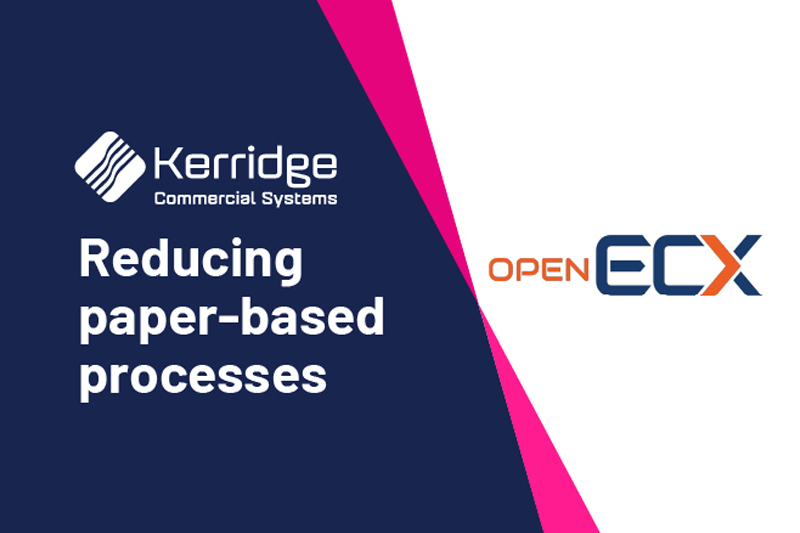With cloud computing now helping many companies protect their IT systems, James Mitchell, Managing Director for Kerridge Commercial Systems (KCS) in the UK and Ireland, looks at how it differs from on-site IT.
Amid supply chain disruption and more sinister and sophisticated cyber threats online, companies must continually streamline their operations, cut costs, and better secure their data to keep trading at a profit. The consequences of not doing so are stark. Several merchants with on-premises IT systems have gone bankrupt due to a cyber-attack where ransomware caused them to lose their ability to trade.
The good news is that cloud computing can help companies achieve efficiencies, improve customer service, and better protect their IT systems from cyber-attacks. Understandably, many in the merchant and distribution industry are now looking at securing and future-proofing their business, so this article outlines the five key benefits for businesses switching from on-premises IT to cloud computing.
Robust defence against cyber threats
Sadly, cyber warfare methods continually enhance and develop. Thousands of new viruses, worms, and other forms of malicious software (or malware) are created each day. Many dangers exist, from advanced persistent threats (ATPs) to malicious ransomware and phishing attacks, and it only takes one successful attack to stop a company from trading.
Research shows that most companies underestimate the length of time a cyber-attack will stop them from trading. Instead of days, it’s often weeks. Combined with the cost of the ransom, being unable to trade, manage stock, or issue invoices can be critical to their business in the long term.
Up to now, companies have been able to run their IT networks themselves, usually within a dedicated room ‘on-premises’. However, as more efficient and sustainable solutions become available, many businesses find this requires careful management and significant cost overheads.
In today’s competitive climate, such an investment of time and money looks increasingly expensive, especially since companies can now take advantage of cloud providers’ best-in-class technologies and expertise.
For example, cloud service providers like Kerridge Commercial Systems (KCS) invest heavily in their use of public cloud technology, creating secure environments beyond most merchant and distribution companies’ ability to afford. They are proactive about conducting research and always look to utilise the best security technologies and expertise, all so they can offer their customers an enhanced level of protection from cyber-attacks.
Better protection against data breaches
When a data breach strikes, companies suffer from criminals gaining unauthorised access to sensitive company data. Consequently, such incursions can lead to the theft of valuable customer information, including names, email addresses, and sensitive financial details.
Being unable to trade after a cyber-attack, such as a data breach, is only one problem, however. After the breach, companies can usually expect worse consequences over the medium to long term, such as significant fines and irretrievable damage to their hard-won reputation.
Cloud computing helps mitigate the risk of data breaches mainly through advanced, centralised data management systems. These systems enhance control over data access and provide sophisticated tools for data integrity checks and intrusion detection. Cloud providers typically also deploy multi-layered security strategies, including a physical security presence at their data centres.

Reduce your IT expenses
Maintaining on-site IT infrastructure can be very expensive and particularly problematic when a business is trying to cope with rising prices and issues within its supply chain. Companies usually shoulder the cost of maintaining hardware and software licenses themselves, while the cost of IT personnel can significantly drain budgets and resources.
Ultimately, cloud computing offers a cost-effective solution by shifting most of these fluctuating expenses to a predictable pay-as-you-go subscription model that stays the same.
Cloud hosting fees typically cover a range of services, including server maintenance, data storage, and increased data bandwidth capability. However, they also cover the maintenance costs for the server hardware, software security updates, technical support, and 24/7 backup provision.
Improve efficiency and scale
The ability to scale operations rapidly and efficiently is crucial in the building supplies industry, where demand can be unpredictable and vary according to fluctuations in season and geography.
However, cloud computing facilitates easy scalability. Using a cloud provider lets your business increase its IT resources without investing upfront in hardware, software, and infrastructure.
This scalability ensures merchant distribution companies can handle peak loads during high-demand periods without disrupting service or performance. Moreover, cloud platforms can integrate seamlessly with AI and machine learning tools, enabling better demand forecasting and inventory management.

Cut carbon emissions
Sustainability is increasingly important in all sectors, including distribution. Cloud computing contributes to environmental sustainability by reducing the carbon footprint of IT operations. Centralised data centres, optimised for energy efficiency, consume significantly less power compared to traditional on-site servers.
Furthermore, cloud providers often use renewable energy sources and implement energy-efficient practices that far surpass what companies could achieve independently.

Additionally, the scalability of cloud resources means that energy usage aligns more closely with actual needs, avoiding the inefficiencies of underutilised on-premise infrastructure. By leveraging cloud computing, businesses move towards greener operations and align with global efforts to reduce energy consumption and emissions.
In conclusion
By migrating to a public cloud network, companies can leverage cutting-edge technology to enhance their operations, reduce costs, and secure their data more effectively.
KCS has seen the demand for its public cloud service, K-Cloud, grow as the pressures faced by on-premises operations have required customers to seek alternatives. In a rapidly evolving digital landscape, public cloud solutions give businesses the perfect secure platform to trade confidently and profitably.
Find out more here
Read more feature articles here





